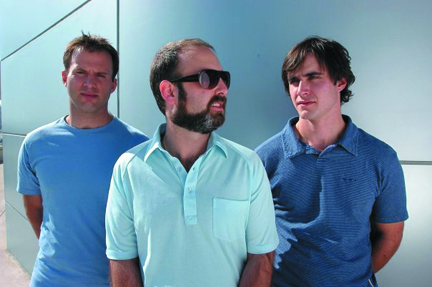The Core: The New Deal

The New Deal drummer Darren Shearer shares his thoughts on The New Deal’s old friends in Broken Social Scene, new live album and borrowed bandmates in The Join.Bassist for a New Day
In all honesty, [bassist Dan Kurtz] used to play a bit more of a passive role in the way that our music was created. But recently, since he started playing in the electro-pop band Dragonette, I think Dan and [keyboardist Jamie Shields] have been more consciously putting together sounds and trying to make the band evolve with our sound. In the early days, I would conduct maybe 65-70 percent of the show. Now Dan’s conducting and also helping elongate certain sections. It’s allowed me to focus a lot more on my playing, whereas I felt like I was more of a conductor before. We’ve landed on a very solid groove. We are nimble and realized we don’t have to switch up every three minutes and we can lay down the groove. The New Deal has always come from the approach of electronic music being played live as opposed to a live band playing electronic music. I think we’ve been keeping our ear to the ground as far as where electro is these days. Dan obviously has a big foot in the electro.
Revisiting the Moment
We record every single show and then we’ll start to hear things from fans like, “that Toronto show was great,” and we’ll look back and say, “You know what, that was actually a really good show that we should look at releasing.” That’s how we picked the show for our new release Live in Toronto: 7-16-09. Then there is the process of putting two hours worth of music into one, 45 to 60 minute long concept. There are certain moments in a New Deal show where we’re kind of getting ready to move to something else or we’re doing something that makes sense live but maybe doesn’t make sense on record. Jamie is good at tearing it down and refining it to the point where it’s a great record.
New Studio Deals
In the last five years or so, Jamie and Dan have had a lot more experience in the studio. Jamie runs his own commercial recording studio in Toronto and Dan’s made a bunch of records and has mastered being able to capture a bit of the live electro thing in the studio. [The New Deal has not released a studio album since 2003 and] I would love to see us now take an LCD Soundsystem-like approach with The New Deal in the studio, too. And I think it’s imminent that we’re gonna do something like that. I’ve noticed in the last four or five years there’s such a new and younger audience coming to see us and the whole scene, too. There is definitely something cool about that.
Joining Jamie
[Our side-project] The Join was developed out of necessity. Dan just released the first Dragonette record and unfortunately wasn’t available for a while. We had a tour booked and he wasn’t able to do it and he felt terrible about it. I had a small outfit that played on Thursday nights in Toronto called The Join, and I asked Jamie what he thought about applying that concept to The New Deal – just installing a new player or two like David Murphy from STS9, Marc Brownstein and Aron Magner from the Disco Biscuits or Joe Russo and Marco Benevento from The Duo each show. I can’t stand rehearsing, so we just went out there and it took on a life of its own. We’ve talked about doing a Join with Stefan Lessard from Dave Matthews Band or even Les Claypool – the more far out and un-jamband, the better. But you have to be careful, too, because if that person doesn’t understand [how to improvise], it can sound like some bad ‘70s fusion, experimental rock, funk thing.
New Social Scenes
The members of the Broken Social Scene family and The New Deal all came from the same place. When we were first starting The New Deal, we had this idea to start a record label and play with Andrew Whiteman from Broken Social Scene but we decided earlier on that it was just gonna be the three of us ‘cause Andrew was doing his own thing – and then, next thing, he’s doing Broken Social Scene. Same with Feist, too. Dan produced her first album in 1999 and she would come down to early New Deal shows in the clubs and hang. She sang on our song “Don’t Blame Yourself” right before she became a massive superstar. I was in seventh grade with James Shaw from [the band] Metric and there was a fairly concentrated group of us that shared the same view point that we were gonna make a go of being professional musicians in spite of the status quo.




















